Leading economist moves Sindh High Court against NFC composition
Bengali asks court to set aside the May 12 notification issued by federal govt

Noted economist Dr Qaiser Bengali asks court to set aside the May 12 notification issued by federal govt. PHOTO: FILE
The Islamabad High Court (IHC) is already hearing a similar petition filed by the PML-N leader and former federal minister Khurram Dastagir Khan against NFC formation.
The NFC is meant to distribute financial resources among the federal government and the provinces. It includes distribution of taxes collected by the federal government which form a divisible pool.
K-P seeks 3% NFC share for tribal districts
According to Article 160 of the Constitution, the president constitutes the NFC after every five years for a period of five years. Once there is a consensus among all stakeholders on a particular formula to distribute the finances, the award is implemented for the next five years.
The PTI led federal government on May 12 formed the 10th NFC to announce the new award. The Ministry of Finance notified constitution of the 11-member commission after approval by federal and provincial members and its terms of reference (ToRs) by President Arif Alvi.
The commission, however, effectively consists of 10 members as the president also authorized the Adviser to the Prime Minister on Finance Dr Abdul Hafeez Shaikh to chair NFC meetings in the absence of the federal finance minister.
Interestingly, there is no room in the Constitution for a PM’s adviser to become even a member of the commission. The commission will have four provincial finance ministers and four non-statutory members representing the provinces and the federal finance secretary as official expert.
In his petition, Bengali said the non-statutory members of the commission have been elected without consulting the provincial governors. “The ToRs of the commission are also unconstitutional,” he said.
10th NFC agenda tilts in favour of Centre
He said Azad Jammu and Kashmir (AJK), Gilgit-Baltistan (G-B) and security expenditures have been included in the NFC agenda but these issues cannot be discussed in the commission meeting.
The petition said the two regions – the AJK and the G-B – as well as the security matters come under the purview of the federal government and parliament.
Bengali also contended that Adviser to the Prime Minister on Finance Dr Shaikh does not have the authority to preside over the NFC meeting. He requested the court to declare notification for formation of the NFC as unconstitutional and illegal and to order reconstitution of the commission. At the last hearing of Dastagir’s petition on June 6, the IHC bench headed by Justice Miangul Hassan Aurangzeb had sought a detailed record of the consultation held for the constitution of the 10th NFC.
On that day, the Ministry of Law and Justice had submitted a one-page reply to the court that did not explain whether or not provinces were taken on board for the constitution of the NFC. Hearing of the case was later adjourned till June 18.
At an earlier hearing on May 21, IHC had asked the petitioner’s counsel to assist the court in light of the top court’s observation about powers of the Centre under Article 149.
The Supreme Court had earlier said the provinces are bound to follow directives of federal government in view of Article 149 (1) & (4) of Constitution.
According to Article 149 (1), the executive authority of every province shall be so exercised as not to impede or prejudice the exercise of the authority of the federation, and the executive authority of the federation shall extend to the giving of such directions to a province as may appear to the federal government to be necessary for that purpose.
“The executive authority of the Federation shall also extend to the giving of directions to a Province as to the manner in which the executive authority thereof is to be exercised for the purpose of preventing any grave menace to the peace or tranquillity or economic life of Pakistan or any part thereof," it says.



















COMMENTS
Comments are moderated and generally will be posted if they are on-topic and not abusive.
For more information, please see our Comments FAQ